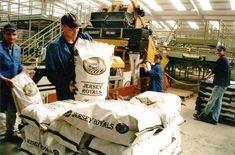
According to unofficial estimates from JRPM, which has sold some 80 per cent of the crop this year, the final production figures for this season should be in the region of 38,000 tonnes. This will come as a pleasant surprise to the individuals concerned, given that the projections earlier in the season were in the region of 30,000t owing to severe frost.
Export tonnage has been maintained remarkably well, considering both the planted area and number of producers has continued to fall, says Paul Le Miere, agriculture policy director of Jersey’s Economic Development Committee. Last year the island had only 14,240 vergees in production, compared with 19,176 vergees (8,500 acres) in 1999. Meanwhile, the number of farmers has declined to around 50, he explains.
Production costs have also risen, now averaging £750 per tonne for growth and harvest. In addition, the use of polythene, which has moved the start of the main commercial season forward from June to May is responsible for adding a further £100 per vergee, while the cost of transportation to Portsmouth for exported produce is also rising.
Nevertheless, the island’s protected potato has a very strong following and its producers remain relatively optimistic. “It has got to be seen as a success,” says Tom Binet, managing director of JRPM. “It has been a difficult season weather-wise. We had damage issues early in the season but demand was fairly high. Prices weren’t quite what we wanted them to be but the increase in volumes will help. We haven’t had time to review everything yet, after the end of exporting, but volumes have been slightly higher than last year.”
Peter Le Maistre, md of JQP is equally positive. “We have had a good demand and people have appreciated the quality of our product.” This year, JQP listed Marks & Spencer, through to Geest, Budgens, and KFF among its customers. “We hope to keep the same customers and will look at the possibility of finding some new ones for next year.” And if this proves successful, there may be a possibility of recruiting additional growers to join JQP’s team of 15, he adds.
Le Maistre says Jersey Royals have a separate following on the UK mainland, which differs from regional sourcing. “We are in a peculiar position on the island - a different animal altogether. We fill in the gap in the early part of the year before UK production, and we have a reputation for quality which is how we manage to keep our place in the market.”
By contrast Binet admits Jersey new potatoes will always come up against competition from other UK suppliers. “We are always under threat from Cornwall and everywhere else. Everything is nibbling away at us.” Yet, like Le Maistre, he claims this just makes Jersey Royal farmers strive to ensure they have a product of consistent quality to offer to the market and to maintain the importance of the brand. At the same time, he suggests the increasing emphasis being placed on regional sourcing will ultimately benefit all producers, in helping to raise the profile of potatoes.
“It should be our aim to sell more and more spuds rather than do battle with other regions.” And there is room in the market for different varieties, he says. “Our production finishes by the end of June/early July which leaves the way clear for the UK seasons. There is only a little bit of an overlap in the last two or three weeks in June.”
Le Maistre says the group’s decision to part company with JRPM was based on the absence of an alternative opportunity to continue farming. But he is realistically optimistic about the future. “It has only been one year so it is too soon to tell but if we are still here in five years’ time, we will have proven that independents have a future. There is certainly a demand for superior quality product and that’s what we are striving to produce.”
While the UK’s overall consumption of potatoes may have dropped this year, figures for Jersey appear slightly higher over the last couple of years, a point which must in part be down to the high profile marketing campaign.
The islanders are also distinct from UK consumers in their shopping techniques, according to Binet. “Every year the trend towards pre-packed potatoes is increasing, whereas on the island there is still a tendency for potatoes to be bought unwashed. It is seen as more traditional.” For the mainland consumers, where convenience plays an increasingly important role in purchasing decisions, ready-washed potatoes are preferred and some retailers have stopped stocking loose Royals altogether.
With regards to the future, Binet says developments are always in the pipeline. “We are always looking at making changes,” he says. “There will be some internal restructuring in the company to improve our efficiency and bring costs down, as always. and how we do that will be decided in the coming weeks.”



